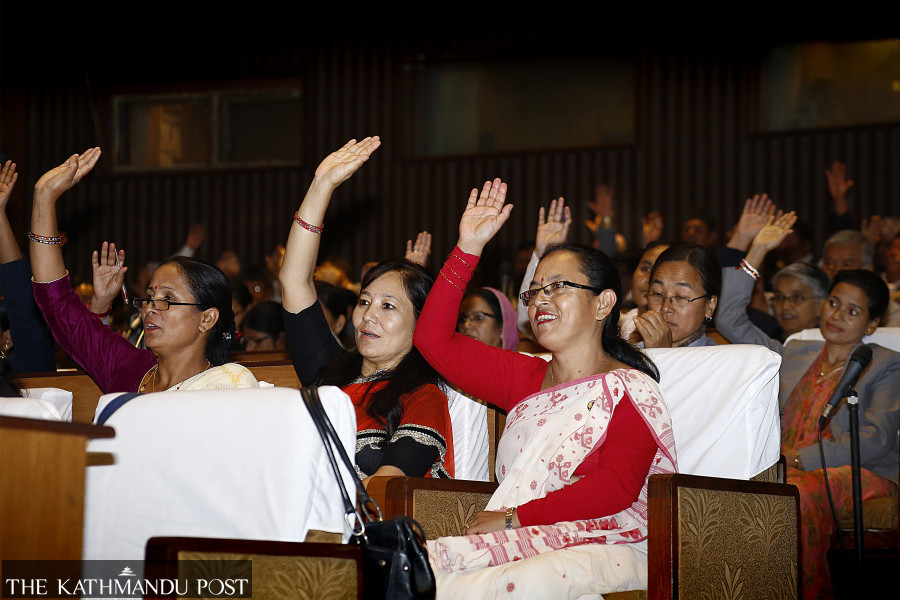Politics
Indirectly elected representatives, most of whom are women, have less powers
In the upcoming elections, women aspire to contest first-past-the-post seats but political parties don’t seem enthusiastic to give them tickets.
Aakriti Ghimire
As top leaders of the five parties in the ruling coalition have been working hard to wrest more seats for each of them, one thing is becoming clearer—there won’t be many women under the direct election system from any of the parties.
Women leaders from the parties say they are trying to build pressure on the top leadership for more women candidates under the direct election system, but chances the top leadership would heed to their concerns are slim.
In the current Parliament, only 3.6 percent of seats are occupied by women who were directly elected in 2017 elections.
While legally, there is no difference between parliamentarians elected directly or under the proportional representation system, women leaders have some concerns. They say there clearly is a sense of inequality.
Lawmakers elected directly by the public’s vote—more than 95 percent of whom are men—hold dominant power, resources and influence, according to experts and lawmakers.
“There’s a system of inequality established in Parliament among those elected directly and indirectly. We have seen that those elected directly assume superiority whereas those elected indirectly are demoralised,” says Bhojraj Pokharel, former chief election commissioner. “All important decision-making powers and responsibilities are reserved for those elected directly. The ministers and those in executive positions are mostly those who contested elections.”
Historically, the majority of these lawmakers directly elected have been men.
During each election in the past, less than five percent of women have been elected from the first-past-the-post system, according to election experts.
In the 1991 parliamentary elections, of the 205 members, seven women lawmakers were directly elected. The number reached 12 of 201 members in the 1999 elections.
In the 2017 elections, only six women lawmakers were elected directly—two from the CPN-UML, three from the CPN (Maoist Centre) and one from the Rastriya Janamorcha—in the 275-member Parliament. The number rose to seven after Bidya Bhattarai was elected in the by-election held in December 2019 after her husband Rabindra Adhikari died in a helicopter crash.
By not allowing women to contest elections, male-dominated political parties have long curtailed women’s access to opportunities to develop their political career and identity.
Usha Kala Rai, a member in Province 1 assembly from CPN-UML, said contesting elections allows women politicians to gain the trust of the citizenry through direct public engagement. “For those who contest direct elections—whether you win or lose, the public will remember your name,” Rai said. “It will allow us women to reach the doors of the public. For those of us who came via indirect elections, the public doesn’t recognise us.”
Rai added, “But political parties are extremely reluctant to allow women to run for direct elections.”
Exposure is crucial to the development of women’s political leadership and personality. Not allowing women to contest elections creates a major barrier to establishing them as trusted politicians in the public eye, according to lawmakers.
In addition, lawmakers say, the distribution of Local Infrastructure Development Partnership Programme, provided by the government to implement development works in electoral constituencies, further marginalised women.
About 76.3 percent of lawmakers elected indirectly were women in the last parliamentary elections.
Since women constitute the majority of those indirectly elected, their access to funds for development work was institutionally restricted by the government.
“Only the directly elected representatives, almost all of whom are men, had access to up to Rs60 million worth funds each for development projects. Public understands development work. Only the directly elected could spend those money, and further gain the public trust,” says Laxmi Pariyar, a member of the House of Representatives of the Nepali Congress.
“Women didn’t have access to funds at all. Neither could we carry out development work, nor could we gain public confidence,” added Pariyar, who was elected under the proportional representation system.
Despite having secured a seat in Parliament, indirectly elected women have been evidently undermined by the government itself, experts and lawmakers say.
“Those who enter Parliament under the proportional representation system are often looked at as a charity case. This subjects them to vulnerability as their inclusion in committees and access to opportunities depends on the leadership’s whims,” says Bimala Rai Paudyal, a member of the National Assembly, who was appointed by the President.
In Nepal’s Parliament, one third of the members must be women because of the constitutional provision.
Article 84(8) of the Constitution of Nepal states that at least one-third of the total members elected from each political party represented in the federal parliament shall be women. Since not many women are fielded directly, parties tend to include women in the list of proportional representation.
The political parties are treating proportional representation as the only way to ensure one-third representation of female candidates in Parliament, all the while blocking women from contesting direct elections.
By preventing women from contesting direct elections, political parties continue to create a fabricated sense of women’s political representation—with no access to funds, powers or resources.
Anjana Bishankhe, a lawmaker and Standing Committee member of the CPN (Maoist Centre), said she is interested in contesting parliamentary elections from Kathmandu-10.
“But I don’t think I will get a chance given the coalition our party has forged,” she told the Post. “I think there won’t be even three women lawmakers from our party this time, who were elected directly last time.”
Lawmakers and experts say that the constant undermining and undervaluing of women within male-dominated political parties is posing a major hurdle for women to run for direct elections. Without the opportunity to contest direct elections, they say, women cannot become politicians.
“Women are considered incapable of partaking in elections. Men who lose elections are given opportunities to run over and over again. But they don’t even let us win,” Rai, who also was a chair of the women's caucus in the first Constituent Assembly, told the Post. “If they don’t let us even run for elections, how will we ever advance in our political careers?”
Experts say without binding laws in place, party leaders will continually marginalise women in Parliament.
“The perception of the party leaders is that—women cannot win; even if they got to contest, that would be the place where they cannot win, and the leaders believe that they don't have money to win,” Pokharel, the former chief elections commissioner, told the Post. “Nepali parties have been ensuring 33 percent women in Parliament only because they are bound by the constitutional provision. Else, they would not do that also.”
Tika R Pradhan contributed reporting.




 8.22°C Kathmandu
8.22°C Kathmandu















